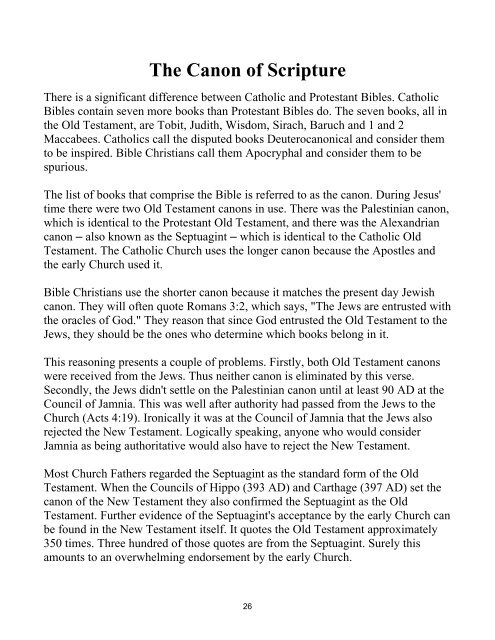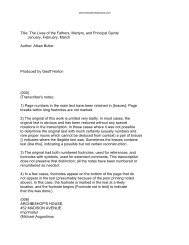Sebastian R. Fama - St. Patrick's Basilica
Sebastian R. Fama - St. Patrick's Basilica
Sebastian R. Fama - St. Patrick's Basilica
You also want an ePaper? Increase the reach of your titles
YUMPU automatically turns print PDFs into web optimized ePapers that Google loves.
The Canon of Scripture<br />
There is a significant difference between Catholic and Protestant Bibles. Catholic<br />
Bibles contain seven more books than Protestant Bibles do. The seven books, all in<br />
the Old Testament, are Tobit, Judith, Wisdom, Sirach, Baruch and 1 and 2<br />
Maccabees. Catholics call the disputed books Deuterocanonical and consider them<br />
to be inspired. Bible Christians call them Apocryphal and consider them to be<br />
spurious.<br />
The list of books that comprise the Bible is referred to as the canon. During Jesus'<br />
time there were two Old Testament canons in use. There was the Palestinian canon,<br />
which is identical to the Protestant Old Testament, and there was the Alexandrian<br />
canon – also known as the Septuagint – which is identical to the Catholic Old<br />
Testament. The Catholic Church uses the longer canon because the Apostles and<br />
the early Church used it.<br />
Bible Christians use the shorter canon because it matches the present day Jewish<br />
canon. They will often quote Romans 3:2, which says, "The Jews are entrusted with<br />
the oracles of God." They reason that since God entrusted the Old Testament to the<br />
Jews, they should be the ones who determine which books belong in it.<br />
This reasoning presents a couple of problems. Firstly, both Old Testament canons<br />
were received from the Jews. Thus neither canon is eliminated by this verse.<br />
Secondly, the Jews didn't settle on the Palestinian canon until at least 90 AD at the<br />
Council of Jamnia. This was well after authority had passed from the Jews to the<br />
Church (Acts 4:19). Ironically it was at the Council of Jamnia that the Jews also<br />
rejected the New Testament. Logically speaking, anyone who would consider<br />
Jamnia as being authoritative would also have to reject the New Testament.<br />
Most Church Fathers regarded the Septuagint as the standard form of the Old<br />
Testament. When the Councils of Hippo (393 AD) and Carthage (397 AD) set the<br />
canon of the New Testament they also confirmed the Septuagint as the Old<br />
Testament. Further evidence of the Septuagint's acceptance by the early Church can<br />
be found in the New Testament itself. It quotes the Old Testament approximately<br />
350 times. Three hundred of those quotes are from the Septuagint. Surely this<br />
amounts to an overwhelming endorsement by the early Church.<br />
26






